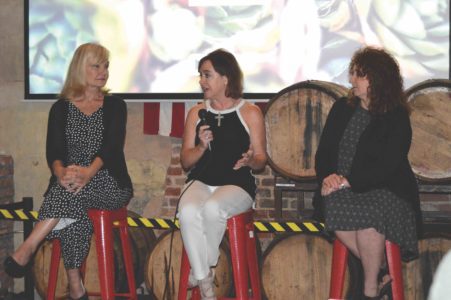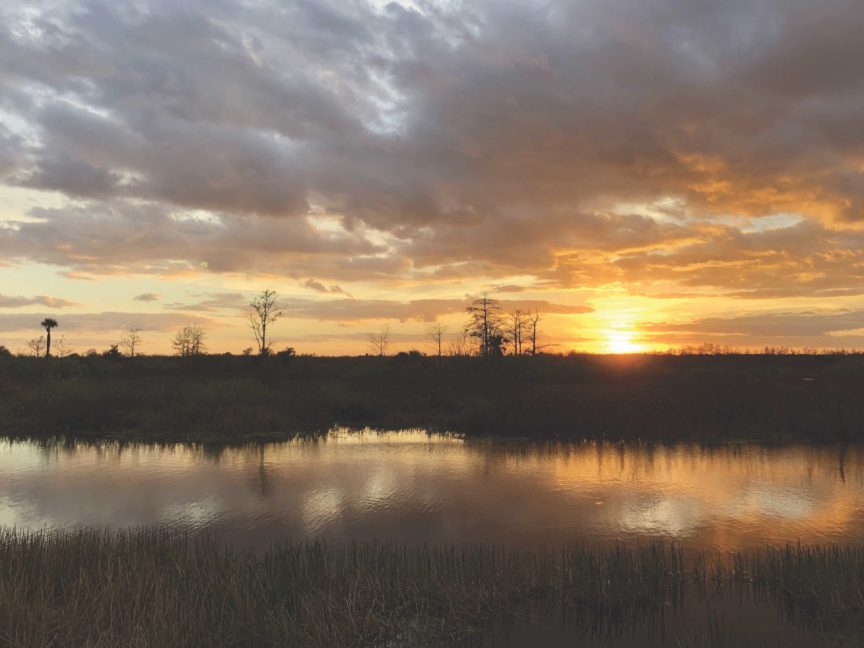“She’s dead. He murdered her. He went in and shot the family. Pixie knew he was going to do this.”
I inhaled sharply. It almost felt as if Charmaine were talking directly to me through the screen. With tears in her eyes, Charmaine Caccioppi opens the film Five Awake by retelling the murder of her friend Pixie Gouaux, who was killed in a domestic violence attack by her daughter’s ex-husband. The attacker also shot five others, killing his ex-employer and his current wife, before taking his own life.
I was watching the film at the Flying Tiger Brewery as part of the Northeast Louisiana Summer Film Series hosted by the Arts Council of Northeast Louisiana, where I work. When my team was selecting films to show at Monroe’s first film series, we selected stories reflective of Louisiana. We didn’t just want stories promoting bons temps, but also honest stories of real people who live in this state. But when we narrowed the selection to include Five Awake due to its tie to Louisiana and because it was directed by a Louisiana woman, I have to admit I was hesitant at first.
Would we attract an audience with such a depressing subject like domestic violence? Would it be appropriate to drink a beer while listening to stories of female homicides? Would we get pushback from our members because the film discussed gun laws? Would we – an arts nonprofit – be making a political statement? It was my supervisor, Barry C. Stevens, who insisted we screen this film. “It is important that people see this,” I remember him saying. “Domestic violence affects all of us.” Unfortunately, his words ring true. Gouaux was one of the 47 women murdered in Louisiana in 2013. According to the Louisiana Coalition Against Domestic Violence, there was at least one domestic homicide in every parish between 1997-2009. Not only that, but Louisiana has the third highest rate of female homicide in the nation, and 73 percent of the victims were wives, ex-wives or girlfriends of their assailant. The statistics may be just numbers, but there are real lives and deaths behind those numbers. The year following Gouaux’s murder, Caccioppi, chief operating officer of United Way of Southeast Louisiana, took her grief and channeled it into justice. She and a cohort of four other women affected by domestic violence are the subjects of the Louisiana-made film Five Awake.
YOU’RE NOT ALONE.
Call (888) 411-1333 to speak to an advocate from The Wellspring. Advocates are available 365 days a year, 24/7.
Rachel Niblett
The documentary short follows the determined efforts of Caccioppi; Kim Sport, attorney and public policy chair for United Way of Southeast Louisiana; Mary Claire Landry, director of New Orleans Family Justice Center; Beth Meeks, former executive director of Louisiana Coalition Against Domestic Violence; and Helena Moreno, former Louisiana state representative and current New Orleans City Council vice president. The women pushed a historic package of anti-domestic violence bills through the 2014 Louisiana legislative session. The legislation, which passed unanimously by both the House and the Senate, does the following:
Grants immediate divorce to victims of domestic abuse.
Mandates abusers to provide spousal compensation.
Classifies a second violation of domestic abuse as a felony.
Allows arrests of violators of protective orders, and while under protective order, violators may not possess firearms.
Sport, whose family member was trying to get a divorce from her abuser, realized Louisiana’s divorce laws were outdated and unsafe for women. Before the 2014 legislative session, victims of domestic violence wanting divorce had to wait 180 days as a time of potential reconciliation, whereas there was no waiting period in cases of adultery. “It takes about seven attempts for a victim to finally break out of an abusive relationship. The reality is that many victims love their abusers and think the abuse is their own fault. Abusers constantly tell their victims it will never happen again, and victims want to believe them or think they can change them,” Sport said. “The time of separation is the most dangerous for a victim because the abuser knows he/she is actually losing control and power over the victim… Now that the waiting period has been removed, victims can avoid an escalation of abuse.”


Louisiana native and film director Donna Dees did not originally plan to create Five Awake. She was intending to create a film documenting the works of female activists. She found that because many women don’t like to take credit for things they accomplish, other female activists must recreate the wheel. Dees should know – she was the founder of the Million Mom March, which before the March for our Lives, was the largest protest against gun violence in American history. She began interviewing an array of activists but stopped once she stumbled upon these stories of the Five Awake women. “To quote former Congresswoman Carolyn McCarthy, who is in the film, women know how to set their egos aside to get things done. We also know the importance of sharing credit and ownership of successful endeavors,” Dees said. “The downside to that quality is that often the recipes for success get lost or forgotten. This is why I wanted to do the film: to provide a roadmap for other women.”
Sport emphasized the women’s collaboration as the key to getting the bills passed. The Five Awake women found that a woman had been murdered in a domestic abuse attack in every Louisiana legislative district. They collected the stories in a bound book, putting faces to the statistics. Then, they met with each legislator and shared the books with them. “We also talked to every organization who had a stake in the legislation – judges, DAs, sheriffs, clerks of court, defense attorneys, and gun rights groups. We shared all of our information with the press who ran editorials in favor of the legislation. We were at the Capitol nearly every day,” Sport said. “But the most important thing is that we had legislative champions, like Sen. J.P. Morrell and Rep. Helena Moreno, who were willing to lead the fight for this legislation. And, we had the support of many other organizations who became our collaborative partners. We also learned how to compromise and wisely followed the advice of those who really wanted to see us succeed.” Five Awake ends with promise and hope. The five women walk out of the Louisiana Capitol chambers as champions, winning a battle in the war that is domestic violence. The package of bills was named the “Pixie Bill,” in memory of Caccioppi’s friend.
The women have continued to work in legislative matters away from the lights and microphones of the documentary crew. In the past five years, the women have pushed nearly 100 additional provisions of law dealing with domestic violence through the Louisiana legislature. “This past year we managed to create a process for transferring firearms from domestic abusers and to make it a serious crime for an abuser to attempt to purchase a firearm. We were able to make domestic violence a factor to be considered in all child custody cases and to make it a felony to commit domestic abuse against a pregnant woman or in the presence of a child,” Sport said.
I wanted guests to walk away from the screening determined to pick up the torch and continue the fight. Rachel Niblett, The Wellspring’s marketing and communications coordinator, and I planned a panel after the screening to discuss the filmmaking process, services The Wellspring offers, and most importantly, what every day people like you and me can do about domestic violence.
I BELIEVE YOU.
Contact a domestic violence shelter and speak to a professional who can help develop a safety plan. Proceed with extreme caution and, if possible, gather financial information – account numbers, access codes, insurance documents, and mortgage paperwork.
Kim Sport
Panelists Dees, Bowman and Caroline Cascio, President/CEO of The Wellspring, all echoed one another. Even though Five Awake showed great progress, there is still work to be done. “To solve the domestic violence crisis in our communities, sometimes the little things, like holding a church bake sale for a domestic violence shelter, might be the action that saves a woman’s life,” Dees said. “It’s important to advocate and speak out, because not everyone has a voice or knows how to use it,” Bowman said. Sport says you can use that voice by talking to your legislator. “Anyone can get involved by just making a phone call to a legislator about a problem you think needs to be addressed or to ask them to vote a certain way on a bill. I think most people would be amazed at how receptive their own legislators would be to work with them on so many issues. They want to hear from their constituents,” she said. “Each and every legislator in this state deserves our gratitude for passing some of the strongest laws in the nation over the past five years to protect victims of domestic violence and to appropriately treat and punish those who abuse them. We need to continue working together to educate all elected and public officials about these laws and, most important, we need to enforce the laws. I am hopeful that we will see a decline in Louisiana’s domestic homicide rate over time. I know it will not happen immediately, but the foundation is there.”
If your women’s group wants to screen Five Awake, email donnadeesthomases@gmail.com for details. I’d personally like to thank all the people involved in the Northeast Louisiana Summer Film Series that made this possible, including our sponsors the Monroe-West Monroe Convention & Visitors Bureau and Flying Tiger Brewery. The Arts Council of Northeast Louisiana is already searching for Louisiana films for the 2019 Northeast Louisiana Summer Film Series. If you or someone you know would like details on how to participate, email region8cdc@gmail.com.








